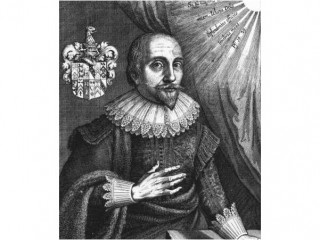
Robert Fludd biography
Date of birth : 1574-01-17
Date of death : 1637-09-08
Birthplace : Kent, England
Nationality : English
Category : Science and Technology
Last modified : 2011-12-21
Credited as : physician and mystical philosopher, Rosicrucian apologist, first to discuss the circulation of the blood
0 votes so far
Robert Fludd was an English physician and mystical philosopher, the son of Sir Thomas Fludd, treasurer of war to Queen Elizabeth in France and the Low Countries, was born at Milgate, Kent.
After studying at St. John's College, Oxford, he travelled in Europe for six years, and became acquainted with the writings of Paracelsus. He subsequently returned to Oxford, became a member of Christ Church, took his medical degrees, and ultimately became a fellow of the College of Physicians. He practiced in London with success, though it is said that he combined with purely medical treatment a good deal of faith healing.
Following Paracelsus, he endeavoured to form a system of philosophy founded on the identity of physical and spiritual truth. The universe and all created things proceed from God, who is the beginning, the end and the sum of all things, and to him they will return. The act of creation is the separation of the active principle (light) from the passive (darkness) in the bosom of the divine unity (God). The universe consists of three worlds; the archetypal (God), the macrocosm (the world), the microcosm (man).
Man is the world in miniature, all the parts of both sympathetically correspond and act upon each other. It is possible for man (and even for the mineral and the plant) to undergo transformation and to win immortality. Fludd's system may be described as a materialistic pantheism, which, allegorically interpreted, he put forward as containing the real meaning of Christianity, revealed to Adam by God himself, handed down by tradition to Moses and the patriarchs, and revealed a second time by Jesus Christ.
The opinions of Fludd had the honor of being refuted by Kepler, Gassendi and Mersenne. Though rapt in mystical speculation, Fludd was a man of varied attainments. He did not disdain scientific experiments, and is thought by some to be the original inventor or the barometer.
He was an ardent defender of the Rosicrucians, and Thomas De Quincey considers him to have been the immediate, as J. V. Andrea was the remote, father of freemasonry. Fludd died on the 8th of September 1637.
Fludd was one of the first persons to discuss the circulation of the blood, and did in fact arrive at the correct conclusion (Miguel Servet explain this idea on Book V of his "Christianismi Restitutio" of 1553). His conclusion was based on the macrocosm-microcosm analogy, a theory in which all occurrences in the microcosm (man) are influenced by the macrocosm (the heavens).
His theory was that the blood must circulate because the heart is like the sun and the blood like the planets and, by this time, it was known that the planets orbit the sun. William Harvey later explained the circulation of blood in more modern and experimental terms, though still referring to the macrocosm-microcosm analogy of Fludd.
Fludd also produced an influential diagram describing the process of perception used in the study of perception, consciousness and psychology. In this diagram, Fludd wanted to explain the nature of the perceptible world as being classified into the four realms of sensual, imaginable, intellectual and sensible.
He describes how these realms are perceived by the psychological faculties which he classified in three pairs; science and imagination, conscience and reflection, and, memory and motive. The diagram shows the interplay and connection between the different psychological faculties within the psyche and their relation to the perceptible world. The soul is described as being present in all the three parts of the psych, always as the intersection between a pair of psychological faculties. Conscience and reflection are also attributed rational, intellectual and human qualities.
















